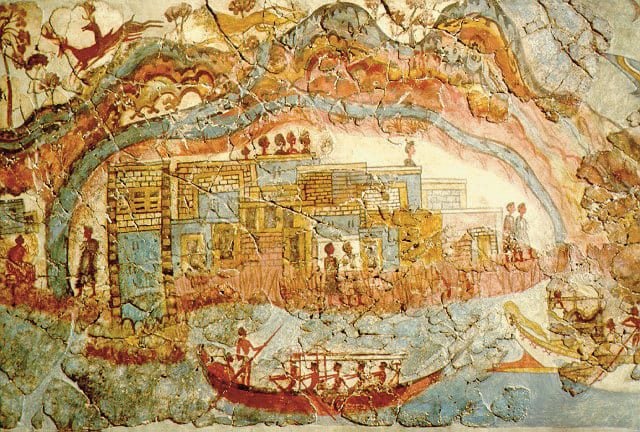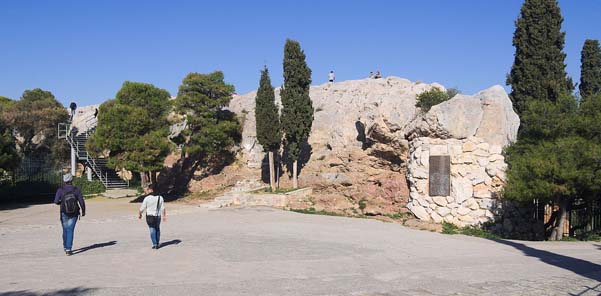[This is a guest-post from my father John Guyton who’s interested in the parallel between Athens’ great plague of 500 BC and the COVID pandemic today. Here’s a link to his personal blog.]
A plague ravaged the young city-state of Athens sometime around 500 BC. The distressed citizens sought help from a revered sage on the island of Crete. Arriving by ship, he calmed the people and encouraged reforms, which they put into practice. When the plague lifted, Athens stood poised to lead a surge of progress for humankind.
Suffering unequally today from a worldwide viral plague, let’s revisit this nearly forgotten story. In retelling it, we’ll expand 3 biblical remarks by the missionary Paul, which can be traced to a prophet who brought reform, healing, and good news to the people of Athens.
Ancient sources identify that person as Epimenides, celebrated by Plato and Aristotle long before Paul arrived.
Who was Epimenides? Could the story of his visit to Athens have a lesson for us today?
“Athens was ripe for a pestilence,” said the scholar William Mitchell Ramsay in a lecture delivered by odd coincidence in 1916, in the middle of a world war and shortly before a global flu epidemic that killed millions.
The situation described below by Ramsay sounds eerily familiar even today:
Under the Pisistratidae Athens grew from a small town into an important city; but in this too rapid increase it outgrew healthy conditions. The laws of sanitation, which the old religion had prescribed for small social groups, were quite inadequate for a large city. Athens was ripe for a pestilence; and, after the tyrants were expelled, the slackness and want of forethought which attended Athenian democracy aggravated the evils of city management, while party strife distracted attention. The result was as recorded by Maximus, Diogenes, and others; a plague struck the city.[1]
Try substituting a few words:
…The rules for public health, which the old order had prescribed for national economies, were quite inadequate for a planet….
The old – border controls, convenient cures, and party strife – would give poor outcomes. Like the Athenians, we need better advice.
From the Roman historian Diogenes Laertius, we learn about the invitation to Epimenides:
He was considered by the Greeks as a person especially beloved by the Gods, on which account, when the Athenians were afflicted by a plague, and the priestess at Delphi enjoined them to purify their city; they sent a ship and Nicias the son of Niceratus to Crete, to invite Epimenides to Athens; and he, coming there in the 46th Olympiad, purified the city and eradicated the plague for that time….[2]
A remarkable achievement. But who was he?
Unfortunately any search for a factual Epimenides must end almost as soon as it starts. The best documented fact is simply that he did come to Athens. Almost all the rest is hidden in legends, in fragments of his reportedly extensive writings, and in histories written hundreds of years after he lived.
Admittedly much of what follows is speculation. His visit came just at the start of the classic age of Athenian and Greek civilization. Did the visit of Epimenides actually spark the Athenian transformation toward greater self-awareness, conjoined effort, and democracy? Here we are searching for plausible clues.
Legend says that Epimenides slept 57 years in a cave before awakening with a clear new vision about human purpose and relation to the Creator. Hidden facts can beget such legends. Religious rites were held in some of the many limestone caves in Crete. He may have received a priestly education there. A widespread belief throughout the eastern Mediterranean region held that Zeus himself as an infant was kept hidden in a Cretan cave to escape the fate of other children of his father Kronos (or Time – for Time day by day eats its children).
Caves on the island of Crete. Upper: Cave at Lisos. Lower: Cave of Psychros.
Alternatively the legend of Epimenides’ sleep could reflect a long incubation in his understanding of transitional Cretan religion.[3]

The magnificent Minoan heritage on the island, overseen by a supreme Goddess, had collapsed several hundred years prior as Mycenaeans from the north immigrated and took control. Conceivably a ferment of cultures still changing could have led a thoughtful person to new, more universal ideas. Perhaps those ideas irked the ruling authorities, so that Epimenides disappeared for a while into the caves.[4]
Regardless of his unknown, but likely complicated experience, Epimenides ultimately emerged to enjoy broad acclaim. As Maximus of Tyre wrote, “he had come into relations with the gods and the oracles of the gods and truth and justice.”[5]
Many in the eastern Mediterranean came to recognize Epimenides for a philosophical conundrum called the Liar’s Paradox. It appears in a brief line recalled from his lost epic poem titled Cretica – “Cretans, always liars, evil beasts, idle bellies.”
It’s easy to suggest that the verse addressed only certain Cretans who arrogantly built a tomb for Zeus in their precinct. According to a local myth Zeus was buried there after dying from a wild boar’s attack. But the phrase “Cretans, always liars” attracted interest because Epimenides was Cretan himself. If he speaks the phrase in general terms, is he lying or telling the truth? If lying, he fits the pattern and so paradoxically affirms the phrase. If telling the truth, then his truthtelling makes the statement a lie.
You may think I’m making too much of a short phrase plucked from a long poem, but “Cretans, always liars” circulated as a philosophical appetizer throughout the region thereafter. It even appears in Paul’s letter to Titus more than 500 years later.
Did Epimenides himself recognize the paradox? Perhaps not when he first penned the line, but I’m inclined to think that, reflecting later, he recognized and proclaimed it. If so, it suggests an awareness of logical analysis and, even more, its limits. It could also mark traits of personal humility curiously combined with audacity, specifically a willingness to “tell it like it is,” and an ability to make an audience smile or laugh. Traits appropriate for a prophetic truthteller.
Is it a stretch to consider Epimenides a logician? Additional evidence comes from the ancient report that Pythagoras came to Crete to visit with Epimenides. As a priest Epimenides may have initiated Pythagoras into the rites of Zeus.[6]
Pythagoras, son of a Mediterranean trader, displayed a remarkable enthusiasm for elucidating angles, figures, and numbers. Pythagoras attracted a cult of devoted followers, who likely produced most of what we ascribe to him today – the Pythagorean theorem and much more in geometry, and harmonic theory of vibrating strings. The Pythagoreans formed secret societies devoted to ritual practices, dietary restrictions, philosophical purification, and geometry. The inner circle were called mathematikoi, giving us the word “mathematics.” Aristotle wrote,
The Pythagorean…having been brought up in the study of mathematics, thought that things are numbers…and that the whole cosmos is a scale and a number.[7]
So Epimenides had at least an indirect claim for logic. And his Liar’s Paradox endures today. It informed the most consequential mathematical discovery of the 20th century. In 1931 a young Austrian named Kurt Gödel succeeded in representing the following statement in pure mathematical terms:
(A) The truth of this theorem cannot be proven.
For a mathematician, (A) is the Liar’s Paradox. Gödel then proceeded to prove that any axiomatic logical system – mathematics being the prime example – of more than minor complexity must be incomplete (that is, capable of formulating true statements like (A) not provable within the system), inconsistent (that is, flawed in the sense of leading logically to two or more contradictory results), or both.[8]
So (A) is true, though unprovable from pure mathematical logic. “Cretans, always liars” reveals this – math cannot explain everything that is true. Gödel’s proof threw cold water on positivist hubris and stopped the Pythagorean dream, pursued with zeal right up through the first decade of the 20th century, to prove “that things are numbers…and that the whole cosmos is a scale and a number.”
The biblical scholar Ramsay amplified the brief line of Cretica quoted above, adding 3 more lines referring to Zeus, on the basis of an ancient Syriac commentary:
They fashioned a tomb for you, holy and high one,
Cretans, always liars, evil beasts, idle bellies.
But you are not dead: you live and abide forever,
For in you we live and move and have our being.[9]
The last line – “…in you we live and move and have our being” – is quoted by Paul on the occasion of his own visit to Athens around 51 AD, described in the book of Acts. When I first encountered those words many years ago, clueless as to their source, I was struck by how starkly they contrasted with what I had learned about primitive Greek mythology.

Did Ramsay get it right? Did Epimenides really write that line? I don’t think it’s a crucial call. Some ancient Mediterranean theologian, and it might as well as have been Epimenides, conceived of Zeus in universal terms. The words hardly describe a god who merely led the Olympian court. Instead they describe eternal God the source of creation, and the ground of being for our active lives together. I’ll suggest that Epimenides moved cautiously close to monotheism.
Think comparatively. Is Zeus described here as slaying a dragon like a Babylonian warrior-god? No. The quote views God as source of life, perhaps more in keeping with a female supreme deity rather than male. A Minoan influence? No supernatural evil foe appears in those lines, and that omission could match a curious archaeological finding on the island of Crete. Despite huge palaces and evidence of vast Minoan wealth, no ancient military fortifications have been found there.
Most importantly the words “in you we live and move and have our being” evoke a sense of unity sheltered within the formative power of the universe.
In his visit to Athens, Paul preached about an “altar to an unknown god.” To understand that altar, let’s continue the description by Diogenes Laertius:
…they sent a ship and Nicias the son of Niceratus to Crete, to invite Epimenides to Athens; and he, coming there in the 46th Olympiad, purified the city and eradicated the plague for that time, he took some black sheep and some white ones, and led them up to the Areopagus, and from thence he let them go wherever they chose, having ordered the attendants to follow them, and wherever any one of them lay down they were to sacrifice him to the god who was the patron of the spot, and so the evil was stayed; and owing to this one may even now find in the different boroughs of the Athenians altars without names, which are a sort of memorial of the propitiation of the gods that then took place.
What can we make of black and white sheep?
In frescoes still visible (even now in the 21st century) from Knossos, the Minoan capital, male figures appear with dark skin and females with light skin. From the same frescoes Epimenides would have been familiar with symbolic coloring, but I’m not certain how to connect that with the sheep. Ramsay suggested that the black sheep were supposed to represent older Greek gods and the white sheep newer Greek gods. His interpretation sounds to me like an anachronism, written by someone accustomed to arguing for a particular religious viewpoint against supposedly inferior or older ones. Yet there is no suggestion that the religious observances differed by the shade of sheep.
Therefore as an alternative, one might consider that the black and white sheep symbolized a spectrum of diverse faiths, a situation likely familiar to the Cretan prophet. They represented a variety of gods, all of whom deserved and all of whom were accorded respect. This was no time to kindle debates or to call up old distinctions. To make this point clear, the gods revered with altars of honor did not even receive names.
To some of his audience, Epimenides may have imparted an additional insight. Consider the possibility that all the gods together might fit within the rubric – “in you we live and move and have our being.”
The plague began to recede, and Epimenides sailed back to Crete. Life in Athens returned to normal.
Normal, or better? The citizens had experienced the plague together and had found common purpose in calling the prophet to their city. Together they heeded the conciliatory instruction of the healer from Crete.
Over the next 100 years Athens reached the peak of its influence in ancient Western history while becoming more democratic. Please don’t get me wrong. I don’t mean to imply that Epimenides permanently or even markedly changed Athenian ideas. But I do think that his message during the plague may have reflected and reinforced the spirit of that pivotal time, allowing the Athenians to triumph over tyrants, plagues, and foreign invasions.
A timeline[10][11] helps to make the point while identifying some Athenians who played major roles:
594 BC Solon as archon cancels peasant debt, begins democracy
~560 Peisistratos seizes power, rules as tyrant (dictator)
510-508 Tyrant rule ends; Cleisthenes extends democracy
~500 Plague and visit of Epimenides
11 Sept 490 Combined Greek force defeats Persian army at Marathon
484 Aeschylus[12] wins prize for tragic theatre
480 Athens is sacked by the Persians
480 Athenian ships defeat Persian navy in the strait of Salamis
468 Sophocles wins prize for tragedy over Aeschylus
462 Pericles institutes full democracy for Athenian citizens
454 Euripides enters the drama contest
~450 Pericles begins paid jury service to include poor citizens
447-432 Parthenon is built with statue of Athena by Phydias
423 Socrates is satirized in Clouds, a comedy by Aristophanes
404 Athens falls to Sparta at end of Peloponnesian War
399 Socrates, judged impious, chooses drinking hemlock over exile
387 Plato’s Academy begins in Athenian suburb of that name
367 Aristotle enrolls in Plato’s Academy
Democracy began prior to Epimenides, who received his invitation to visit via majority consent. The 5th century BC began with military struggle, then moved toward relative peace. Before the most renowned philosophers came the tragedians of Greek theatre.
Some 70-80 years after the visit of Epimenides, Socrates enchanted the youth of Athens with wisdom born of humility and audacity. Like the Cretan sage, Socrates had to negotiate diverse, transitional religious beliefs among his fellow citizens, young and old.
Xenophon in his Memorabilia of Socrates wrote about a new understanding that his departed mentor had voiced:
He believed that the gods care for men, but not in the way that most people believe they do. They suppose that the gods know some things but not others; but Socrates believed that they know everything, both words and actions and unspoken intentions, and that they are present everywhere and communicate to people about all kinds of human affairs…. Socrates…in his relationship to the gods said and did only what was recognizably consistent with the deepest reverence.[13]
Such beliefs could have been expressed by Epimenides, as eastern Mediterranean religions began to transform from polytheism to monotheism. If the gods “know everything” including unspoken intentions, does “everything” refer only to human understanding, or do the gods know everything about each others’ thoughts? If the latter, then one might as well speak of multiple roles of one God, or one source of universal wisdom. There can be only one omniscient God. Epimenides referred to Zeus in that vein – “In you we live and move and have our being.” Perhaps it’s too much to think that he could have influenced Socrates over the span of two or three generations. At least both expressed a spirit of bold exploratory thinking as the classical age of ancient Greece began and progressed.
What lessons might we learn from the mission of Epimenides to the city of Athens, resulting from a plague? I’ll list a few, and you may think of others.
- As a preliminary step, sometimes it’s necessary to expel the tyrants.
- Cretans, always liars. Logic and science are good, but incomplete. Science can explain many things, but cannot explain everything that needs an answer. Express your faith through humble acts of will, both as individuals and in community, and do not acquiesce to brazen authority girded by money and power.
- In you we live and move and have our being. Some truths have to be lived and not merely tested. Unseen, perhaps universal motivation may be discovered. Among choices we face, some of the most important reach beyond the individual, calling for investment of self in others, identity enlarged in community.
- Altar to an unknown god. When gods divide us, it remains important to proffer all of them due honor and respect, if only because others have pledged faith to them. But it is not always necessary to name them. Perhaps all are one, manifested in various ways.
- Crawl into a cave. If pressures mount fiercely, social distance. Find a cave. Address God by the name you choose. It’s okay to fall asleep. A shared dream may beckon as you wake.
Images: Header – Temple on the Acropolis in Athens by Chronis Yan on Unsplash. Caves of Crete, all CC by SA 3.0, Wikimedia Commons: upper, Wolfgang Sauber; lower, Torben Schramme. Minoan fresco, Wikimedia Commons, by scan from: Dirk Herdemerten: Die Wandmalereien von Thera(santorini). 2007, GRIN Verlag, ISBN 363865821X. Areopagus, C Messier, CC by SA 4.0, Wikimedia Commons. Sheep, Papi, CC Public domain on Pixabay.
[1] Ramsay, W.M. Gifford Lecture on Epimenides, chap. 3 in Asianic Elements in Greek Civilisation, University of Edinburgh, 1915-1916, New Haven: Yale University Press, 1928; pp. 20-39. Accessed 6/27/2020 at http://www.elfinspell.com/ClassicalTexts/Ramsay-AsianicElementsInGreekCivilization/Chap3-Epimenides.html
[2] Diogenes Laertius. The Lives and Opinions of Eminent Philosophers. Transl. by Yonge, C.D., London: Henry G. Bohn, 1853. Accessed 8/16/2016 at http://classicpersuasion.org/pw/diogenes/dlepimenides.htm.
[3] Immanuel Kant likewise began his major contributions late in life, describing himself as awakening from a “dogmatic slumber” upon instigation from the Scottish skeptic, David Hume.
[4] Strataridaki, A.I. Epimenides of Crete: some notes on his life, works, and the verse ‘Kretes aei pseustai’, Fortunatae 2 (1991): 207-223. Accessed 6/27/2020 at https://dialnet.unirioja.es/descarga/articulo/163834.pdf.
[5] Ramsay, op. cit.
[6] Strataridaki, op.cit.
[7] O.Connor, J.J. and Robertson, E.F. Pythagoras of Samos, accessed 6/27/2020 at http://www-groups.dcs.st-and.ac.uk/~history/Biographies/Pythagoras.html.
[8] Nagel E and Newman JR. Gödel’s Proof. New York University Press, New York, revised edition, 2001, Kindle edition.
[9] Ramsay, op. cit.
[10] https://www.oxfordreference.com/view/10.1093/acref/9780191736452.timeline.0001, accessed 6/27/2020.
[11] https://ancient-greece.org/resources/timeline.html, accessed 6/27/2020.
[12] Aeschylus seems to echo Epimenides in the dramatist’s retelling of the fateful expedition to Troy. Aeschylus has King Agamemnon saying this:
Zeus: whatever he may be, if this name
pleases him in invocation,
thus I call upon him.
from Greene D. and Lattimore R. Greek Tragedies, Vol 1. Phoenix Books, Univ. of Chicago Press, Chicago, IL, 1960.
[13] Xenophon. Memoirs of Socrates, in Conversations of Socrates. Transl. by Hugh Tredennick and Robin Waterfield. London, Penguin, 1990, p. 72.


















